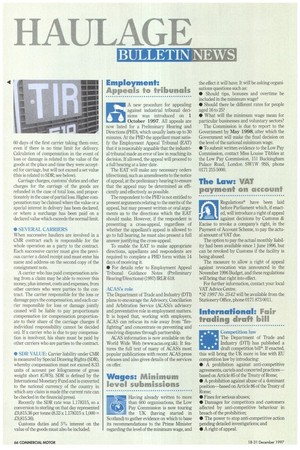Employment: Appeals to tribunals
Page 68

If you've noticed an error in this article please click here to report it so we can fix it.
1EA new procedure for appealing against industrial tribunal decisions was introduced on 1 October 1997. All appeals are now listed for a Preliminary Hearing and Directions (PHD), which usually Lasts up to 30 minutes. At the PHD the appellant must satisfy the Employment Appeal Tribunal (EAT) that it is reasonably arguable that the industrial tribunal made an error of law in reaching its decision. If allowed, the appeal will proceed to a full hearing at a later date.
The EAT will make any necessary orders (directions), such as amendments to the notice of appeal, at the preliminary hearing to ensure that the appeal may be determined as efficiently and effectively as possible.
The respondent to the PHD is not entitled to present arguments relating to the merits of the appeal, but may present written or oral arguments as to the directions which the EAT should make. However, if the respondent is presenting a cross-appeal, regardless of whether the appellant's appeal is allowed to go to full hearing, he must also present a full answer justifying the cross-appeal.
To enable the EAT to make appropriate directions, appellants and respondents are required to complete a PHD form within 14 days of receiving it.
• For details refer to Employment Appeal Tribunal Guidance Notes (Preliminary Hearing/Directions) (1997) IRLR 618.
ACAS's role The Department of Trade and Industry (DTI) plans to encourage the Advisory, Conciliation and Arbitration Service (ACAS)'s advisory and preventative role in employment matters. It is hoped that, working with employers, ACAS can refocus its role away from "firefighting" and concentrate on preventing and resolving disputes through partnership.
ACAS information is now available on the World Wide Web (www.acas.org.uk). It features the full text of many of ACAS's most popular publications with recent ACAS press releases and also gives details of the services on offer.












































































































































